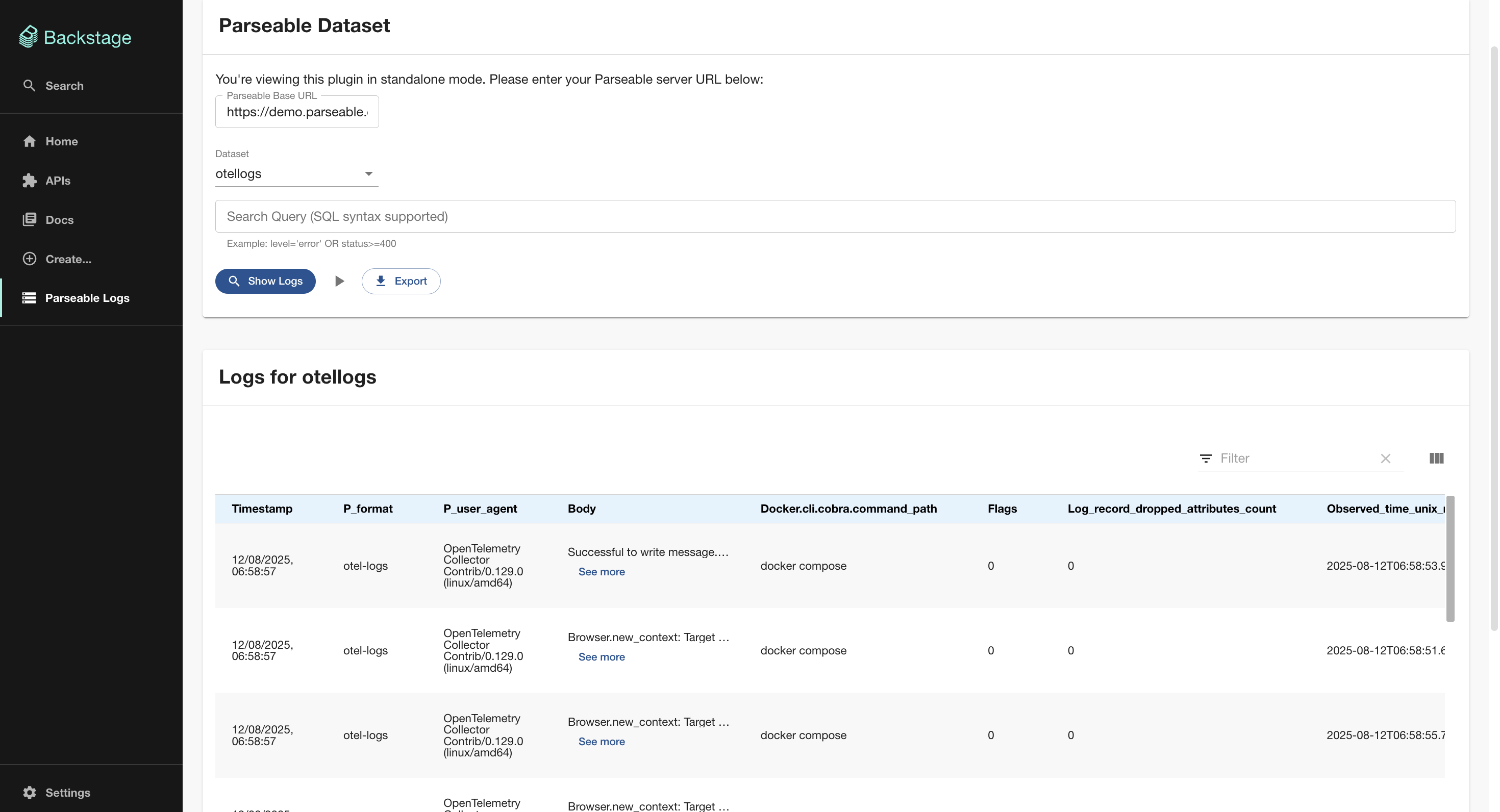Introducing the Parseable Dataset Plugin for Backstage
We're excited to announce the release of the Parseable Dataset Plugin for Backstage – a powerful integration that brings unified observability capabilities of Parseable directly into your Backstage developer portal. This plugin seamlessly connects Parseable, the unified observability platform, with Backstage, Spotify's open-source developer portal framework.

Why Parseable + Backstage?
In modern microservices architectures, developers often struggle with context switching between multiple tools. They need to jump from their service catalog to logging platforms, from documentation to monitoring dashboards. This fragmentation slows down incident response and makes it harder to maintain a holistic view of service health.
The Parseable Dataset Plugin for Backstage solves this by embedding Parseable's plugin directly into your service catalog, creating a single pane of glass for developers to understand, monitor, and debug their services.
Key Features
Contextual Log Viewing
Access logs directly from your service entities in Backstage. If you can see the service, you can see its logs.
Real-Time Log Streaming
Watch logs flow in real-time with our live tail feature. Perfect for monitoring deployments or debugging active issues.
Flexible Deployment
Use the plugin in two ways:
- Entity Integration: Add log tabs to specific services
- Standalone Page: Access a centralized log viewer from the navigation
Secure Authentication
Supports basic authentication with environment-based credential management, keeping your log data secure.
Getting Started
Installation
Add the plugin to your Backstage app:
# From your Backstage root directory
yarn --cwd packages/app add @parseable/backstage-plugin-logstreamConfiguration
- Configure credentials in
app-config.yaml:
parseable:
basicAuthCredential: ${PARSEABLE_B64_CRED}- Set environment variable:
# Create base64 encoded credentials
echo -n "username:password" | base64
# Export the credential
export PARSEABLE_B64_CRED="<your-base64-encoded-credential>"- Add to your App.tsx:
import {
parseableLogstreamPlugin,
ParseableLogstreamPage,
} from "@parseable/backstage-plugin-logstream";
// Add route
<Route path="/parseable-logs" element={<ParseableLogstreamPage />} />;- Enable for entities:
apiVersion: backstage.io/v1alpha1
kind: Component
metadata:
name: my-service
annotations:
parseable.io/base-url: https://parseable.mycompany.com
spec:
type: service
lifecycle: production
owner: team-backendReal-World Use Cases
1. Incident Response
During an incident, developers can navigate to the affected service in Backstage and immediately access its logs without searching for the right Parseable dashboard or remembering log stream names.
2. Deployment Monitoring
Use the live tail feature to monitor logs during deployments, watching for errors or unexpected behavior as new code rolls out.
3. Historical Analysis
Export logs from specific time ranges to analyze patterns, create reports, or share data with stakeholders who don't have direct access to your logging infrastructure.
4. Cross-Service Debugging
The standalone page allows developers to quickly switch between different service logs when debugging issues that span multiple microservices.
Architecture Overview
The plugin follows Backstage's extension architecture:
┌─────────────────┐ ┌──────────────────┐ ┌─────────────────┐
│ │ │ │ │ │
│ Backstage UI │────▶│ Plugin API │────▶│ Parseable API │
│ │ │ │ │ │
└─────────────────┘ └──────────────────┘ └─────────────────┘
│ │ │
▼ ▼ ▼
Entity Pages Authentication Telemetry Streams
Navigation Credential Mgmt Data Export
Live Updates API ClientWhat's Next?
We're committed to continuously improving the Parseable Backstage Plugin. Here's what's on our roadmap:
- Enhanced Visualizations: Charts and graphs for log patterns
- Alert Integration: Surface Parseable alerts in Backstage
- Saved Queries: Store and share common log queries
- Multi-cluster Support: Manage logs from multiple Parseable instances
- Performance Metrics: Display log ingestion rates and query performance
Contributing
The Parseable Backstage Plugin is open source and we welcome contributions! Whether it's bug fixes, new features, or documentation improvements, we'd love to have you involved.
- GitHub Repository: github.com/parseable/backstage-plugin-parseable
- Issues & Features: GitHub Issues
Ready to unify your observability with your developer portal? The Parseable Dataset Plugin for Backstage is available now on npm:
npm install @parseable/backstage-plugin-logstreamQuick Demo
Want to see it in action? Try it with our demo server:
# In your entity annotation
parseable.io/base-url: https://demo.parseable.comConclusion
The Parseable Dataset Plugin for Backstage represents our commitment to improving the developer experience in observability. By bringing observability directly into your service catalog, we're reducing context switches, speeding up debugging, and making it easier for teams to maintain their services.
We believe that observability tools should meet developers where they are and increasingly, that's in their developer portal. This plugin is just the beginning of our journey to make Parseable a natural extension of your existing development workflows.
Join our community:


